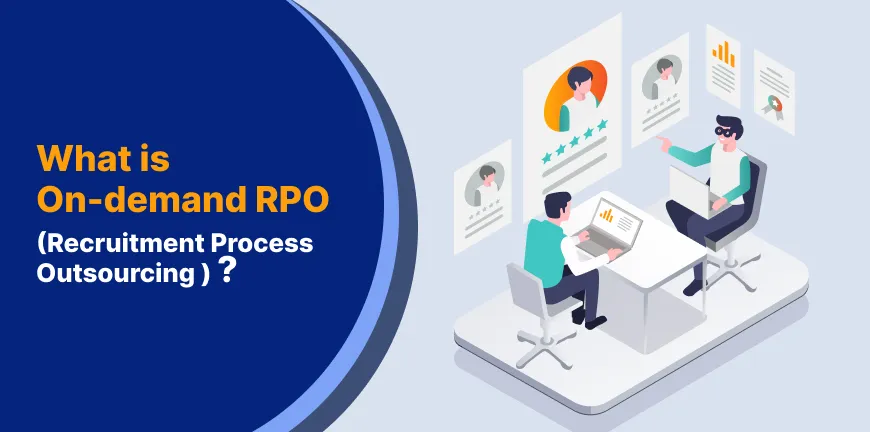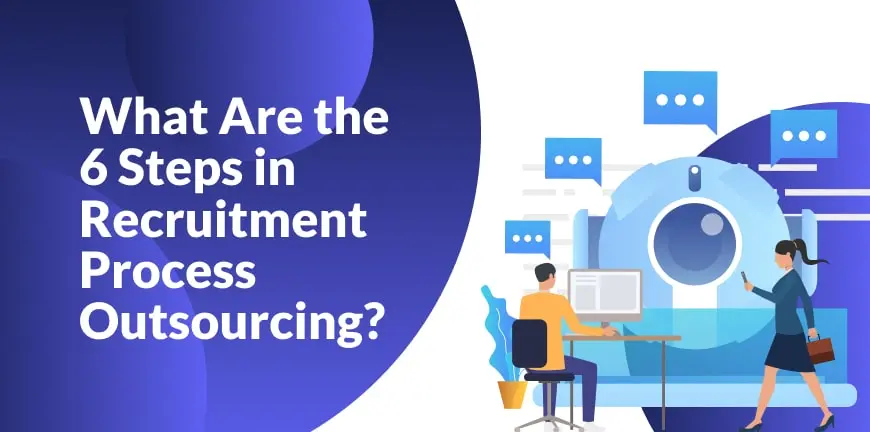
Purpose of ZOHO Help Desk & Features
24/09/2025
Payroll Migration: A Step-by-Step Guide for a Smooth Transition
25/09/2025Organisations across various sectors have been experiencing significant uncertainty in their hiring needs. The job market’s dynamic nature has created an environment resulting in drastic changes in hiring requirements, challenging even the most talented recruiting teams. Whether companies are facing sudden talent shortages or want to fill skill gaps, flexible solutions are most sought after to support the talent acquisition efforts. This has led to the advent of On-demand RPO services.
What is On-Demand RPO?
On-demand RPO provides hiring managers and internal recruitment teams with all the benefits of ‘traditional RPO’, but on a short-term basis- It can be used to fill specific hard-to-source roles (technology-led positions, for example) or to add much-needed capacity to an internal team, without the permanent commitment to an RPO model. On-demand RPO solutions offer companies flexibility and scalability, allowing them to access recruitment services tailored to their evolving workforce needs.
This temporary, on-demand version of a recruitment process outsourcing solution is highly cost-effective for sudden spikes in hiring, with internal recruiters benefiting from an embedded expert team with specialist experience in everything from improving the candidate experience to engaging niche or passive candidates.
How Does On-Demand RPO Work?
1. Understand Client’s workforce needs
An on-demand RPO provider begins by understanding your hiring needs, including the required skills, qualifications, and timelines.
2. Create a customised plan
Once the RPO provider understands your requirements clearly, they draft a plan that maps out all the resources, timelines and expected outcomes.
3. An expert recruitment team is deployed
When a hiring need arises, the client organisation invokes its on-demand RPO service, gaining access to a dedicated team of recruiters with expertise to hire skilled candidates for its open roles.
4. Sourcing and Screening
The on-demand RPO team of recruiters commence the recruitment process. This includes sourcing candidates through job boards, social media, and professional networks. Extending job offers to the most suitable ones and onboarding them seamlessly.
5. Shortlisted candidates presented
Shortlisted candidates from the screening process are presented to the client along with their complete details. This includes their experience, skills, and culture fit.
6. Integrates with the current systems of the company
An experienced on-demand RPO company works with the company’s existing recruitment processes and technologies to minimise disruptions to the workflow.
7. Seamless integration with your team
On-demand RPO acts as an extension of your current HR department. The third-party recruiters collaborate with your internal team to ensure proper communication and a match with your company’s culture and values.
8. Scaling up or down as needed.
Based on the workforce needs, clients can scale up or down on the RPO service. Once their hiring needs are satisfied, clients can deactivate the on-demand services and pause the associated costs of the on-demand RPO model. According to their needs, they can engage our on-demand RPO solutions.
Key Features of On-demand RPO
An on-demand RPO model offers features that make it desirable for companies seeking to remain agile in the face of evolving hiring demands.
- Rapid Access to Recruitment Experts: You gain access to external recruiters who can swiftly augment your HR team. They help hire the right personnel for hiring surges or skill gaps.
- Scalability & Flexibility: You may hire as per your business needs. Sometimes you may want to hire professionals for a particular project or even during seasonal workloads. With this model, you are free to do so.
- No commitments of full-time employment: Since there is no need to hire personnel on a full-time basis, resources spent on recruitment can be spent mindfully.
- Chance to offer from a diverse pool of candidates: RPO providers have access to a candidate pool with individuals having niche skills, tech skills, soft skills and diverse backgrounds and experiences.
- Cost-Efficiency: Recruitment costs can be cut down drastically. How? By reducing costs spent on posting job ads and inefficient processes.
- Full Compliance Support: RPO providers are experienced recruiters. Following the rules and regulations to hire the right people is just as important as hiring the right individuals. These RPO providers provide comprehensive compliance support.
- Workforce Performance Insights: Receive analytics and market benchmarks to optimise hiring outcomes and candidate experience.
On-Demand RPO is all about speed and efficiency without losing quality. You get a team of experts ready to jump in, handle urgent recruitment needs, and leave when the job is done.
Key Benefits of On-demand RPO
A professional On-demand RPO provider offers recruitment solutions that not only help save costs and provide access to a vast talent pool but also address the company’s fluctuating workforce needs.
1. Cost-effective
Traditional RPO solutions or recruitment solutions involve fixed costs and are a continuous process. On-demand RPO solutions eliminate the need for dedicated in-house recruiters, thereby reducing payroll and benefits costs. Companies only need to pay for the services they need.
2. Scalability and flexibility
Companies can hire individuals as needed to meet their business requirements. Sometimes, you may want to hire professionals for a specific project or during seasonal workloads. With this model, you are free to do so.
3. Improved efficiency and quality
RPO providers would have mastered the art of recruitment. They not only know the best practices but also incorporate them by using the best technologies and strategies. This helps enhance the efficiency of their recruitment efforts.
4. Improved candidate experience
By engaging on-demand RPO services, companies can ensure a better candidate experience. How? Expert recruiters incorporate the best recruitment practices, whether it’s using the right technology or processes. This enhances employer branding and helps hire better candidates.
5. Allows time to focus on core business
Outsourcing your recruitment needs to an expert on-demand RPO consultancy like Alp Consulting not only gives you access to quality candidates but also allows you the time to focus on your core business.
6. Reduced risk through full compliance support
A trusted on-demand RPO company follows efficient but also compliant hiring procedures. They help companies navigate the complex compliance and legal requirements associated with hiring.
On-Demand RPO vs Traditional RPO
| Feature | On-Demand RPO | Traditional Recruitment |
| Flexibility | Depending on the changing needs of the organisation, the recruitment resources can be scaled up or down. | In this model, the recruitment process is a continuous process wherein companies seek to recruit talent regardless of workforce changes. |
| Engagement Model | The recruitment services are paid for only when used. This means on a per-project, per-role, or weekly basis. | Often based on per-hire fees or full-cycle agency commissions, with less cost control. |
| Scope | Focuses on immediate needs, including sourcing, screening, and interviewing for specific periods or projects. | Handles the full recruitment life cycle, but usually for single, ongoing vacancies. |
| Scalability | Can quickly ramp up or wind down recruiter support according to demand. | Difficult to rapidly scale up without overburdening existing HR or hiring new staff. |
| Access to Talent | Instantly leverages the RPO provider’s networks, tech, and expertise. | Limited to agency/in-house recruiters’ reach and tools. |
| Speed | Designed for faster time-to-hire; ideal for sudden surges or backfills. | Often slower; time-to-hire may be extended due to manual processes or fewer dedicated resources. |
| Control | Some process control shifts to the provider, but collaboration is encouraged. | Complete control/ownership remains with the company, which may lack outside expertise. |
| Cost | Cost-effective for high-volume or project-based needs; pay for the capacity used. | Costs are higher due to the upfront fees that must be paid without a guarantee of suitable candidates. |
| Best Use Case | Urgent hiring spikes, short-term expansions, new project launches, and hard-to-fill skill sets. | Niche/single role hiring, ongoing low-volume recruitment, complete lifecycle control. |
On-Demand RPO Trends
1. AI-powered RPO
RPO partners are utilising AI across sourcing, screening, interview orchestration, and candidate communications. This has helped improve time-to-hire, quality of hire and cost-per-hire.
2. Skills-based hiring
Skills-first priority is getting bigger. Employers are expanding skills-based assessments and relaxing degree requirements to find non-traditional talent.
3. Pay transparency
RPO programs must standardise salary-range disclosures, audit comp data, and train recruiters on compliant messaging.
4. Data privacy
The Digital Personal Data Protection Act (DPDPA) has draft 2025 rules and is poised for enforcement; companies recruiting in India should prepare consent, retention, and breach-response processes now.
5. On-demand RPO to handle rise in hiring needs
Economic uncertainty has led companies to seek more agile recruitment models that eliminate the need for long-term lock-in.
6. Demand for flexible workers
Analysts and providers are promoting the convergence of RPO and MSP to establish a unified view of costs, risks, and pipelines.
7. Outcome-based pricing models
2025 RPO deals increasingly include outcome levers such as time-to-hire targets, candidate quality metrics, and retention thresholds rather than only per-req fees.
8. Market growth
Industry trackers predict that the recruitment outsourcing market is expected to continue expanding through 2025. Tech, analytics, and domain specialisation are key differentiators.
Conclusion
On-Demand RPO (Recruitment Process Outsourcing) can be a lifesaver for an organisation’s HR team. Every organisation, no matter its industry, is bound to experience fluctuations in its hiring needs from time to time. This need can either halt hiring or cause a sudden surge in hiring needs. Alp Consulting is your ideal On-demand RPO partner to address these recruitment needs
FAQs- Frequently Asked Questions
1. What is On-Demand RPO in recruitment?
On-demand RPO provides hiring managers and internal recruitment teams with all the benefits of ‘traditional RPO’, but on a short-term basis- It can be used to fill specific hard-to-source roles (technology-led positions, for example) or to add much-needed capacity to an internal team, without the permanent commitment to an RPO model.
2. How does on-demand RPO differ from traditional RPO?
On-demand RPO provides flexible, short-term recruitment support for fluctuating hiring needs, unlike traditional RPO, which offers long-term, comprehensive services for steady hiring demands.
3. What are the main benefits of on-demand RPO?
On-demand RPO provides recruitment solutions that not only help save costs and offer access to a vast talent pool but also address a company’s fluctuating workforce needs.
4. Which companies should use on-demand RPO?
Companies with a small internal recruitment team, those facing temporary or unpredictable hiring surges, those launching a new project with urgent hiring needs, or those looking to test RPO services before a long-term commitment should consider using on-demand RPO.
5. Is on-demand RPO cost-effective when compared to traditional recruitment?
On-demand RPO services are paid for only when used. This means companies either pay per project, per role, or on a weekly basis. Therefore, yes, it is more cost-effective than traditional recruitment methods.
Contact Us For Business Enquiry

Amit Saproo
Amit Saproo is the Head of Operations at ALP Consulting with nearly 17 years of experience in Executive Search, RPO, Leadership, and IT & Engineering recruitment. He leads nationwide recruitment programs across Technology, BFSI, and R&D domains, driving strategic hiring solutions for diverse client needs. Amit excels in building and managing high-performance teams that deliver scalable, end-to-end recruitment and consulting services.




